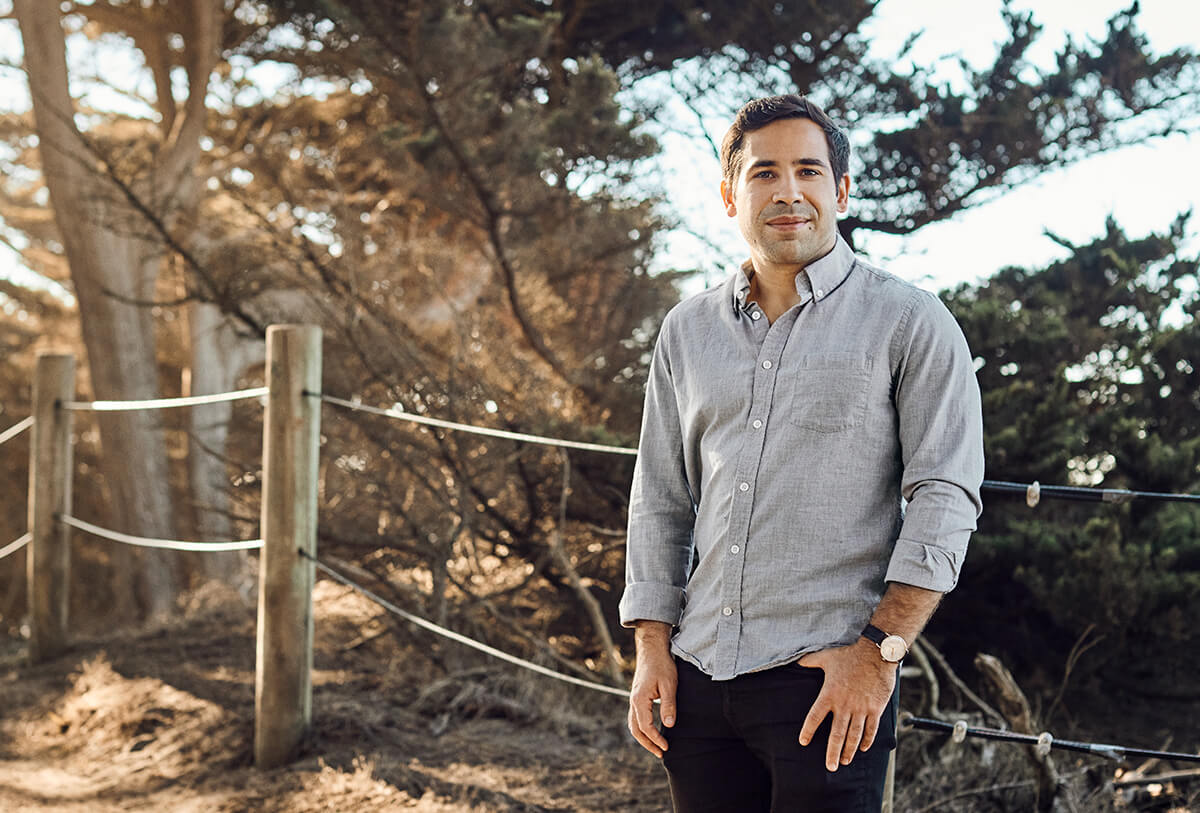Becoming Ross Boucher
 Alumnus Ross Boucher took his USC Viterbi education and parlayed it into launching multiple successful startups. (Photos/Cody Pickens)
Alumnus Ross Boucher took his USC Viterbi education and parlayed it into launching multiple successful startups. (Photos/Cody Pickens)WHEN ROSS BOUCHER was born in 1985, a mobile phone, the Motorola DynaTAC, cost $4,000. A 10-hour charge allowed for 30 minutes of talk time. By the time he turned 3, the first fully digital consumer camera, the Dycam Model 1, was sold in the United States. It could store a whopping 10 photos.
Boucher started attending school around the same time the very first website came online (CERN, which is still online). In the early 2000s, broadband internet was introduced just in time for him to apply to USC Viterbi.
“In my admissions essay,” said Boucher, who received a B.S. in computer engineering and computer science, an M.S. in electrical engineering in 2007 and currently sits on the CS Department advisory board. “I wrote that what I loved about computers is the idea that you could create these tools that would take something very difficult and expensive, something that typically required a large team, and make it easy. I found computer engineering intellectually intriguing that way.”
Before turning 30, Boucher had co-founded two companies and made a name for himself building software development solutions for the biggest names in the industry. His first startup, 280 North, was acquired by Motorola in 2010 for a reported $20 million.
He went on to help launch Stripe, a platform now used by millions of companies, including Facebook and Salesforce.com, to accept online payments and run technologically sophisticated financial operations. In 2014, he created Tonic to provide rapid prototyping tools for web development. Tonic was eventually acquired for an undisclosed amount and rebranded as RunKit.
At USC Viterbi, he split his time between classes and working as a stage technician at Bovard Auditorium, laboring behind the scenes on big events like the 2004 Democratic presidential primary debates that were hosted by USC. Boucher also became lifelong friends with Francisco Tolmasky, B.S. ’06, Tom Robinson, B.S. ’07, M.S. ’07, and David Firestone, B.S. ’07, M.S. ’07, with whom he would go on to create his first company.
“We were all big fans of Apple computers, a relatively small group of people at the time,” Boucher said. “It was just fun.” They would meet after class to build software for the Macintosh, with no illusions of grandeur, named their company 280 North, after the highway that goes through Cupertino, California, Apple’s headquarters.
“Apple was only a fraction of the company it is today,” he said. “You could barely spot an Apple logo on campus.”
But the internet and Apple were fused in Boucher’s mind. When he graduated, Boucher took the 280 to Cupertino and went to work for Apple. Tolmasky had joined a year earlier and was already working on Apple’s next big thing. They continued to put time into 280 North on the side.
Their timing in Silicon Valley couldn’t have been better. A month after Boucher graduated from USC, Apple released its first iPhone. The rest is history, though it’s easy now to forget that the first iPhone didn’t support 3G, multitasking or third-party apps. You couldn’t copy and paste text or customize the home screen.
“There was still a long way to go and the tools available to web developers at the time weren’t very good,” Boucher said. “So we started working on tools that only big companies like Google had the capacity to build. We wanted to make them available to anyone.”
Boucher and his friends heard of a little-known startup accelerator called Y Combinator and applied. They landed $18,000 in seed funding and quit their jobs at Apple to work full time on 280 North. Y Combinator went on to launch more than 2,000 companies including Airbnb, Twitch and Dropbox.
“We didn’t get one big check after Y Combinator, but a series of small checks to keep us moving forward,” Boucher said.
Two years later, Motorola — the same company selling $4,000 mobile phones when Boucher was born — emailed with an offer: $20 million for 280 North and their brains working full time at Motorola. Boucher only stayed six months. There just wasn’t enough improvisation going on, he said, and too many big ideas were brewing behind the scenes, all needing faster, better and cheaper development tools.
“A couple of friends I met through Y Combinator started a company called Stripe to revolutionize the way companies do financial transactions online,” Boucher said. “They asked me to join them. I thought it would be fun.”
Stripe now has more than 2,500 employees and is today Silicon Valley’s most valuable startup at $36 billion, according to CNBC. Boucher eventually left Stripe, moved to New York, started RunKit, sold it — and then went off into the sunset to find himself. At 35, he says he had lived long enough to see the future become history, so he went looking for the present.

“These days I’m doing a lot of reading and focusing on things that I’ve neglected to do while working nonstop,” he said. On Ross’s bookshelf you will find “Why Buddhism is True” by Robert Wright, the “Ender’s Game” series, and “Uncanny Valley” by Anna Weiner among others. He continues to prefect his handstand and has taken courses in woodworking and pottery.
In addition to his role on the CS advisory board, Ross has also found meaningful ways to give back in support of USC Viterbi students including scholarships, mentoring and helping student start-ups get launched.
His advice to students trying to follow the same path: “Do as I say, not as I do. Know what your goals are first. Don’t set out planning to get acquired, because most likely it won’t happen that way.”
He encourages students to dream up solutions to problems, start companies and put in the time required to achieve big goals. “Let’s not pretend — the work is hard,” he said. “But there’s also a huge amount of luck involved. Don’t do all of it at the expense of not becoming a whole person.”



